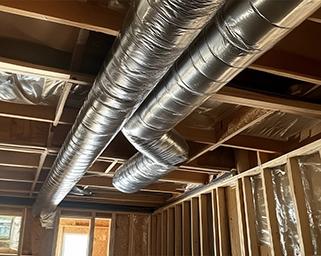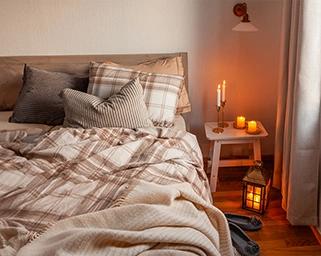Air Filters for Allergies? Learn How HVAC Can Help
Summary: Using higher quality HVAC air filters with a higher MERV rating can help reduce allergy symptoms at home
Research shows that 25.7% of adults and 18.9% of children suffer from seasonal allergies in the United States. Starting in the early days of spring and lasting until fall, allergy season means months of congestion, itchy eyes, sore throats, and sneezing for sufferers.
While medications can help ease the symptoms of seasonal allergies, it is difficult to avoid allergens altogether. Because they are present in the air that sufferers breathe outside and indoors, allergies become a frustrating and uncomfortable experience for millions of people. Fortunately, some steps can be taken to reduce the amount of allergens found inside our homes. For instance, HVAC air filters and other Indoor Air Quality (IAQ) solutions, like QuikBox air cleaners, remove dust and allergens from the air.
By understanding how air filters for allergies work and how to choose the right ones, indoor air quality can be immensely improved.
How do air filters for allergies work?
The air outdoors and in our homes is filled with tiny particles, often invisible to the naked eye. Dust, pollen, pet dander, and other irritants float through the air and are subsequently breathed in. In those without allergies, this typically doesn’t cause a problem in small amounts. For those with allergies, however, these triggers can lead to sneezing, stuffy or runny nose, and itchy nose, eyes, ears, or mouth.
Air filters for allergies can help reduce the number of allergens in your home by capturing particles in the air that can trigger allergies. These particles include dust, pollen, pet dander, and other irritants. The air filter traps them, leaving significantly fewer particles in the air. In turn, this reduces the irritation experienced by allergy sufferers and reduces their symptoms.
While this is a huge benefit of an air filter in the home, they also play a critical role in preventing dust and debris from accumulating within the system, which can reduce its lifespan and increase energy consumption.
Types of air filters for allergies
There are several types of HVAC air filters, including fiberglass filters, washable filters, pleated filters, electrostatic filters, and HEPA filters. Fiberglass filters are common and typically the least expensive air filter type. They are constructed with a layered fiberglass material that can capture large particles like lint and dust. Pleated filters are made of polyester or cotton and have a much larger surface area than fiberglass filters. Because of this, many experts recommend pleated varieties over fiberglass for allergies.
Additionally, washable filters are simply removed, washed, dried, and replaced. Many eco-friendly households opt for this style as it creates less waste than other varieties, which are removed and thrown away. However, washable filters might not offer the best filtration, allowing smaller particles through.
Conversely, electromagnetic filters rely on an electrostatic charge to attract and capture even the smallest particles. HEPA (or High-Efficiency Particulate Air) filters are among the most popular air filters for allergies because they can capture particles as small as 0.3 microns, meaning they remove most irritants from the air. However, HEPA filters may not be suitable for some residential HVAC systems. Your Trane dealer can help you determine the best air filter for your system. Consider the SlimFit Filter Rack if you're using 1" filters.
What is a MERV rating?
MERV ratings, or Minimum Efficiency Reporting Value ratings, are used to rate how effective air filters are at removing particles from the air. The higher the MERV rating, the more efficient the air filter is at capturing even the smallest particles from the air. Typically, these ratings range between 1 and 16, with the highest levels indicating the highest levels of filtration.
Despite this, the highest MERV ratings are reserved for hospitals or laboratories requiring impeccable filtration. In these cases, specialized commercial HVAC systems are in place, which are designed for these HEPA filters. Residential systems are typically not compatible with these extremely high MERV-rated filters and may cause damage to the system. To treat the air for allergens with filtration, however, MERV ratings of 11-13 are needed to capture fine particulate.
| Filter Type | MERV Rating | Effectiveness | Cost |
| Fiberglass filter | MERV 1-4 | Filters out only the largest particles. Replace every 30 days or more often. | Cheapest |
| Washable filter | MERV 1-4 | Filters out only the largest particles. Clean often. | Cheap for low MERV rating, more for higher MERV rating |
| Pleated filter | MERV 8-13 | Filters out more allergens at each MERV level. Change every 30-90 days. | Mid-range pricing, but generally lasts longer |
| Electrostatic filter | MERV 5-12 | Pleated electrostatic filters have a higher MERV rating. Change every 30-90 days. | Higher MERV ratings mean higher prices |
| Trane QuikBox™ Air Cleaner | MERV 11 or 13 | Filters out particles .3-1 microns in size). Replace every 6 months. | More expensive, but can be cost-effective because they can last 6 months. |
| Trane CleanEffects™ Air Cleaner | MERV 16 | Filters out up to 99.98% of particles 0.3 microns and larger) Reusable filter, clean every 3-9 months. | Most expensive, but it can last for years with proper maintenance. |
| HEPA filters | MERV 17-20 | Not recommended for residential use. | Not recommended for residential use. |
How to choose the right air filter for allergies
When choosing an air filter for allergies, you should consider the MERV rating, the filter type, and the filter size. Filters with higher MERV ratings are more effective at capturing particles that can trigger allergies, but they can also restrict airflow, potentially reducing the efficiency of your HVAC system. Your Trane HVAC dealer can help you choose the right filters.
The type of filter you choose will depend on your budget, the level of filtration you need, and whether you prefer a disposable or reusable filter. The filter size is also important; replace your filter with the same size included during installation for optimal performance. Get help locating your filter or figuring out your filter size.
Maintenance and replacement of filters
Air filters must be properly maintained and replaced regularly to ensure efficiency and prevent damage to the HVAC system. Generally, air filters should be replaced every 30 to 90 days, but it's important to check the filter regularly to ensure it is not clogged or dirty. Keep in mind that there are also different types of filters.
A washable filter must be cleaned and dried before reinstalling it in the HVAC system. These filters are not replaced regularly; they are maintained with proper cleaning. Other forms of air filters must be removed and replaced with new filters. This requires owners to know the proper size and type of filter they are using.
You can measure the filter or contact a local Trane dealer for assistance if you need more clarification. By keeping up with maintenance and replacement, you ensure that allergens in the home are kept to a minimum while also expanding the lifespan of your HVAC system.
Learn more about HVAC air filter cleaning and maintenance.
Other ways to reduce allergens in your home
Installing HVAC air filters in your home with a high level of filtration is one of the most effective ways to reduce allergens. Despite this, there are other measures that you can take to remove irritants from the air indoors. Some of the most common ways to further reduce allergens include:
- Use a vacuum cleaner equipped with a HEPA filter regularly. This aids in removing immense amounts of dust and debris from floors, carpets, and other upholstery throughout the home.
- Invest in a dehumidifier to reduce the moisture level in the air and decrease the development of organic matter.
- Skip harsh cleaners and use natural products like baking soda and vinegar to clean your home. Store-bought varieties often contain fragrances and harsh chemicals, which can cause flare-ups in those with allergies or respiratory problems.
- Wash your sheets regularly to minimize dust and dirt.
- Avoid feather dusters when dusting your home. Feather dusters and similar tools simply knock the dust into the air. Instead, use a damp cloth or a vacuum attachment for dust removal. Also, dust areas like the windows and ceiling fan blades for maximum effectiveness.
- Take your shoes off and change your clothes when coming inside from outdoors. This minimizes the amount of pollen, dander, and outdoor irritants brought into the home.
- Bathe and groom your pets regularly. Regular bathing and grooming ensure you catch loose hair and dander that may otherwise end up in the air, on the furniture, or floors throughout your home. Also, remember that air filters for allergies may need to be changed more frequently if pets are present.
Connect with a local indoor air quality expert
For allergy sufferers, improving their indoor air quality (IAQ) can drastically alter their day-to-day lives for the better. While there are several ways to reduce irritants in a home, installing an HVAC air filter for allergies is the most effective. When choosing an air filter, consider the MERV rating, the type of filter, and the filter size, along with your existing HVAC system. A local indoor air quality expert can guide you through choosing air filters for allergies that are compatible with your HVAC unit. Find a local Trane dealer today to get started.




